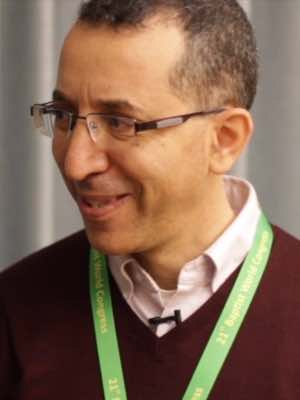I am an evangelical Palestinian born and raised in Jerusalem.
This influences how I see the U.S. decision to move its embassy to Jerusalem, which President Trump announced on Dec. 6.
I appreciate the president asking God to bless both Israelis and Palestinians. I have been asking God to do the same for decades and continue to dedicate my life for this purpose.
However, it seems that we don’t have the same understanding of the word “bless.”
No doubt that blessing includes the peace of Jerusalem and its peoples.
No doubt that blessing includes living in a community of equality, equity and justice for both Palestinians and Jews in Israel/Palestine.
No doubt that Jesus blessed the peacemakers
In addition, divine blessing is much more than “political justice.” It includes human rights as the minimum requirement.
It expands the requirements with the logic of divine love that seeks justice (righteousness) and holistic peace for both Palestinians and Israeli Jews.
Blessing must be relational. It communicates not only good will but also empowerment to fulfill the divine mandate. But what kind of empowerment did the move of the embassy accomplish?
The Israeli government is happy and thankful, but the decision empowered Netanyahu’s government to become more rigid in their ongoing systemic oppression of hundreds of thousands of Palestinians in Jerusalem.
It empowered the Israeli government to ignore many U.N. resolutions concerning Jerusalem.
On the other hand, Palestinians are depressed and hopeless after the failure of the peace process.
The recent decision about moving the embassy provokes their despair and convinces them the United States is not a fair mediator.
It empowers the war-makers among Palestinians and attenuates the legitimacy of Palestinian peacemakers.
In addition, the region of the Middle East is struggling with extreme religious ideologies, and such a decision is giving further ammunition for more speeches rooted in hate.
Because we are very close to Christmas, perhaps it is appropriate to be reminded of Micah 4. The prophet envisioned Jerusalem as a city of peace and justice for all the nations. Jews and Palestinians are included.
Everyone can sit freely, not under occupation or oppression, but in their property. The ones who were forced out of the city because of political or religious oppression shall be restored.
Refugees shall come back to Jerusalem. There are no checkpoints or visa restrictions or ethnic superiorities. Honoring God in showing love, mercy and justice to all shall be our first priority.
Thankfully, the prince of peace, Jesus Christ, is the only way for making this vision possible (Micah 5:2). But everyone else is also called to uplift Micah’s vision and be its messenger.
Unfortunately, I don’t believe that the recent decision of moving the embassy is compatible with the blessing of Micah, which is rooted in his vision for promoting peace and justice to Jerusalem, and from Jerusalem to the rest of the world.
I hope that Trump will further reflect on the issue of Jerusalem and seek to be a true messenger of blessing to all the inhabitants of Jerusalem and to all those who love Jerusalem.
I hope that he will not only reconsider the unwise decision pertinent to Jerusalem but also will reflect on practical strategies to advocate peace and justice for Jerusalem and all of its inhabitants.
May the prince of peace whose birth we celebrate at Christmas strengthen us to build bridges instead of barriers, especially in Jerusalem.
Yohanna Katanacho is the academic dean at Nazareth Evangelical College and professor of biblical studies at Bethlehem Bible College. He lives in Nazareth and continually commutes to Bethlehem. A version of this article first appeared on Come and See and is used with permission. You can follow him on Twitter @ykatanacho.
Editor’s note: A column by Fred Guttman, rabbi of Temple Emanuel in Greensboro, North Carolina, supporting the embassy decision is available here.
Yohanna Katanacho is the academic dean at Nazareth Evangelical College and professor of biblical studies at Bethlehem Bible College. He lives in Nazareth and continually commutes to Bethlehem.

